“An Offer (Not) Made, An Offer (Not) Refused”
Novac Hrenovac Inc. vs Das Spiel Kebab Ltd.
1. A worker with a dream
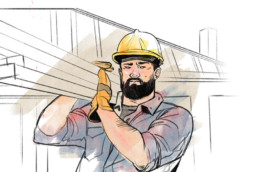
Świętopełk Świątek was born in Łódź (PL) in 1987 in the family of a construction worker and a primary school teacher, with a German heritage through one of his grandfathers.
Świętopełk’s parents were nice people; but, perhaps, not the most modern in their approach to bringing up their child. Early on, they taught their Świętopełk that life is hard, all politicians lie, and there’s no such thing as depression – just boredom from to not working hard enough.
Having graduated from the middle school, Świętopełk went straight to working with his father in the construction business, lending his hand to whatever projects his father’s company undertook.
In his free time, Świętopełk was playing video games. With a lot of free time, he was getting good at it – whenever he had extra money, he spent it on expanding his library on Steam, where his nickname was SWIETOSPIELK87.
His big dream was to create his own video game; something that seemed way out of reach for a person with his background, his education, his modest means and the city where he lived.
2. An engineer with a creative itch
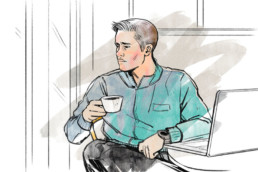
Marek Adamcik was born in Brno (CZ) in 1991 in the family of a German mathematician and a Czech film decorator.
While his parents didn’t earn that much, both of their families were well off thanks to a bit of generational wealth, owning summer houses in the countryside and cars.
Marek’s upbringing, with his father teaching him chess and his mother taking him to film sets, gave Marek a mind that was both creative and structured.
His big passion turned out to be video games: in the school, he had the nickname of ‘SuperMarek’. Marek especially adored games that dealt with automation – whether it was about robots, film studios, or horse ranches.
Following college, Marek applied for a job of a software engineer at the national railway company and got accepted with ease. However, this type of job didn’t really scratch his creative itch. He kept thinking that he needs to change his life.
3. Building booths at Gamescom
In July 2015, Świętopełk applied for a seasonal job at Booth Freund GmbH, a construction company that built exhibition booths in Cologne, at the Kölnmesse.
The wages were low, but he didn’t care much about it, because he got the chance to see – from the inside! – the biggest video games exhibition in Europe, Gamescom: the construction for the 7th edition of the trade show, with over 800 exhibitors, was about to start.
To his advantage, he spoke decent German – thanks to his mother using the language around the house (“Ordnung muss sein”, “Spazierengehen ist besser als Fernsehen”, etc.), and the company was happy to hire him (more than half of the firm’s temporary workers that year came from Poland).
4. A birthday trip to unwind
The year of 2015 saw Marek hitting an all-time low on the personal side: he remained profoundly unhappy in his job with the national railway company, but at the same time he couldn’t change it due to the constrained labor market in Czech Republic.
He applied for work at various games companies, but it didn’t get him far, since in the east, the requirement was to speak Russian (Minsk, Moscow, Kiev) or Polish (Warsaw); while in the west, the requirement was to speak English (London, Stockholm) or French (Paris). But Marek only spoke Czech and German – and lacking experience in the industry, he wasn’t a candidate whose special circumstances the major studios would be willing to accommodate.
As to German games studios, he was too old for their low-paid junior roles, while lacking industry experience for the roles that paid well enough to afford the required relocation costs.
All in all, Marek was feeling miserable.
Gone were the days when he was known as SuperMarek – these days, his colleagues called him SmutnýMarek instead.
In June 2015, Marek quarreled with his then-girlfriend, Anna von Reichenberg, and they split. To destress, Marek started to smoke marijuana and drink strong liquor. For the first time, his parents began to worry about him.
To give Marek a boost, his father purchased for him the tickets to travel to Cologne, where he would attend Gamescom 2015. Marek’s parents were hoping that immersing their son into something which he truly loved – video games – would extinguish Marek’s newly found need for drugs and alcohol.
5. A chance encounter
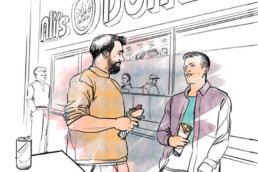
In Cologne, Marek and Świętopełk ran into each other at the booth LOKOMOTIWSKI 2 – an indie hit of a solo Slovak developer, a game about trains and their automation.
While most attendees of Gamescom passed the booth without displaying much interest in such a niche product, both Marek and Świętopełk stayed glued to the demo stations at the booth all day long, playing the game until the developer himself kicked them out (they were cursing at the horrible user interface of the game, saying that only a complete idiot would opt for such a small font, and a confusing interface for selection and confirmation).
Leaving the booth, Marek and Świętopełk were walking together towards the exit, and as they exchanged a few words, they discovered that both spoke German, both were not local, and both were short on money.
Together, they went looking for a reasonably priced kebab shop, and while waiting for their food at Ali’s on Venloer Straße, they discussed the kind of games that they would make, had they had a chance.
Świętopełk’s idea was to make a game about a ramen shop that serves grumpy customers. Marek’s idea was to make a game about transporting dead people around town and growing the business of a funeral home by stimulating more deaths in the neighborhood. They exchanged email addresses and agreed to connect once they got home.
6. “My Ramen Shop”
Over the course of the next few months, as the new friends discussed their ideas for the sort of games they wished they could make, they have discovered that while Marek’s concept was rather sketchy, the idea of Świętopełk was very well thought through – including a detailed core loop that could be tested with a printed prototype.
Świętopełk found that now that he had a partner to talk to, it was much easier for him to put down more and more of his design ideas in writing, and the number of Confluence pages that he created and maintained kept growing.
When he wasn’t near a computer, he jotted down notebook after notebook of scribblings – between building stands for Fetish Messe, PMW Expo and Spoga Horse.
Over the course of several months, Marek and Świętopełk became close friends, and eventually started to develop a prototype of a game that they called “My Ramen Shop”.
7. Das Spiel Kebab
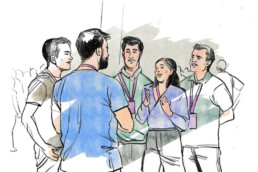
Once the prototype of My Ramen Shop became playable, Marek and Świętopełk decided to demonstrate it at one of the game jams. The closest opportunity was a jam in Zürich, scheduled for March 2016 and organized by Foogle Moogle, Inc. (a global digital extractor who ran games events to greenwash the company’s Swiss tax residence status), with heavily discounted accommodation at the official hotel where the event took part.
As a part of the submission process, the two friends had to declare the name of their team, and they opted for calling it Das Spiel Kebab (DSK), as a reference to their first meeting in Cologne that led to their current partnership (they had not registered any legal entity at the time, DSK was only the name that they used in public).
To their surprise, My Ramen Shop received the grand prize, coming ahead of Make a Break! (a game about escaping from prison) and OnlyStars (a game about managing a porn studio). But more than that, Marek and Świętopełk also received encouraging feedback of the other developers whom they’ve met at the jam: the other teams loved the consistency of DSK’s game design, and how all the small rules of the game combined to create a hard-to-put-down experience.
8. Novac Hrenovac Inc.
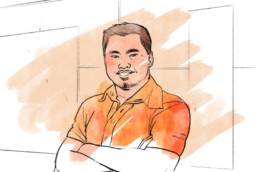
Returning from Zürich to their respective cities, Marek and Świętopełk started to look for a way to fund the full version of the game. They hoped to find a publisher who would provide them with the development budget, so that they could quit their regular jobs and focus on the game full-time.
Sadly, nobody wanted to work with a team of 2 developers split between 2 countries in Eastern Europe, without any track record in the industry…
…that is, nobody except for a Serbian entrepreneur Marko Marković, a US-based executive who ran a games company called Novac Hrenovac Inc. (incorporated in Baharosa, a convenient location for trading operations; a former US colony, with double taxation treaties with most of the major countries in the world).
As a new publisher, NHI was hungry for content, with Marko traveling around the world to scout far and wide – which is how he ended up attending the Zürich games jam.
9. Marko’s Charms
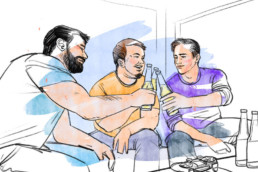
Marko – the founder, the manager and the principal owner of NHI – had a charismatic personality and possessed a somewhat controversial reputation. Marko was a wealthy individual, having made his initial capital with a real estate business in Barcelona (or was it with crypto scams in Ukraine? many things about Marko weren’t exactly clear…).
After playing the prototype of My Ramen Shop, Marko invited Marek and Świętopełk to his house in Santa Monica, during which he took them out for a sailing trip on his personal boat. They were impressed.
In the following days, he introduced them to his friends in the LA-based games industry, including a nerd known as “Scotch”, famous for creating a bestselling puzzle game that he sold for a lot of money to Foogle Moogle, Inc. (after that he retired to California, dedicating the new chapter of his life to shitposting on Twitter). Now Świętopełk and Marek were truly blown away: this was the life that they could only dream about. Scotch’s house, full of game consoles, candy dispensers and fancy cars, was the highlight of the entire trip.
Towards the end of Świętopełk and Marek’s visit, Marko shared his vision of the future: that eventually the big money will be made on the mobile, and that if his new friends wanted to join Scotch and other industry celebrities, they should start looking into this platform now.
10. The Deal
After the US trip, Marek and Świętopełk had little doubts about their future ambitions: they wanted to have Marko as their publisher, so that they could focus on creating the game while he would focus on selling as many copies as possible. He was a man with the money, the connections and the grand vision for how to succeed in the market.
Everything seemed to fall in place, and shortly after their voyage Marek and Świętopełk received Marko’s emailed proposal to publish My Ramen Shop under the auspices of NHI.
Regardless of how wealthy Marko has been on the personal front, the terms of the agreement which he offered to DSK were rather humble: an advance of €20.000, paid out when the game was feature complete – to help the developers license the engine and commission some extra art and music.
The founders would have to continue with their daily jobs and would not be able to afford to hire any extra staff… – not exactly their dream scenario.
However, Marek and Świętopełk stood to collect a hefty 70% share of royalties, and were offered a “joint, full and equal” access to the game’s Steam account – Marko was very upfront about having nothing to hide, on contrast with some of the larger publishers in the industry that rarely shared real-time sales data or gave access to the publishing platforms.
In Marko’s words, this deal was as fair as such deals could be: DSK could become very rich – if they managed to ship a good game.
The contract was fairly long (Marko called it “standard bullshit”). After some deliberation, in July of 2016 Świętopełk and Marek went ahead and signed it (without understanding much), waving it off as “just paperwork”. Despite still not having a registered company at that time yet, they put “Das Spiel Kebab (Limited)” as the party to the contract, promising Marko that they would register the entity shortly (the problem was, really, with being short on money for the registration expenses).
Marko did not mind this, and advised them to opt for one of the offshore jurisdictions with beneficial terms for games/tech companies – such as Marzaria, the ex-Italian colony in the north of Africa which lured games developers with a 2.5% corporate tax on IP-derived revenue (the recent incentive that came about thanks to the work of the Marzaria Games Association, in cooperation with Marzaria’s ministry of economy).
A few months after the signing of the deal, Marek and Świętopełk followed Marko’s advice, and incorporated a company in Marzaria, with the name Das Spiel Kebab Ltd.
11. Release
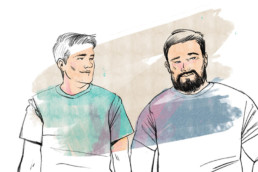
After 4 years of hard work, DSK’s game released in March 2020 on the PC platform – and became very successful. No, it wasn’t a walk in the park – but yes, they managed to pull this off, creating something beautiful from scratch!
A few months prior to the public release, on a Zoom call, Marko suggested to Świętopełk and Marek that the game’s title needed “a punch”: something that rhymes and can strike a chord with the teenage crowd. Brainstorming during the call, they came up with the idea to rename “My Ramen Shop” to “Top Slop: My Ramen Shop” – which sounded more edgy, but also more commercial, as in “maybe this is a successful series already?”.
The game went viral. Even the new hires at the business development team of Steam were sharing screenshots from the game, congratulating the indie team on such a successful launch of their first title (it also helped that some of them were friends with Marko).
The 70% of royalties that Marko has written into the deal with DSK turned out to be based on “net sales” (after consumer tax, platform’s commission and out-of-pocket marketing costs), but despite that, Świętopełk and Marek still found themselves with more money than they have ever had before, and were able to finally quit their daily jobs to focus on what they liked the most: making games.
They hired a small team of programmers and artists to prototype their next title.
Both also got married to the girls they’ve met during the development run – a turn of events that made Świętopełk’s mother especially happy.
12. Funeral Parlor Simulator
As the royalties from the sales of Top Slop: My Ramen Shop rolled in, DSK was busy working on their next game – a management/story mix of genres based on Marek’s idea about running a funeral home as a business.
In the summer of 2020, based on a barebones alpha build, Marko at NHI happily signed up the project, with the same terms as before (literally, saving a copy of the earlier contract under a new file name), and the game was announced as “Funeral Parlor Simulator” (FPS).
After 2 years of development – half as long as it took DSK to complete Top Slop: My Ramen Shop, thanks to the leads having help from the small team they now had – NHI released DSK’s FPS on PC and on PlayStation, with the game becoming one of the bestselling games on Steam in September 2022.
13. Troubles at NHI
Around the time of release of FPS, NHI started experiencing financial problems. While the autumn of 2022 was bad, the beginning of 2023 turned out to be even worse.
As it turned out, Marko was using the revenue from Top Slop: My Ramen Shop and FPS to fund his company’s other games projects, which were all rather unsuccessful (including “The Amazing Caca Simulator”, “Beaver Fever” and the controversial teenager-aimed 3D adventure “Here, There, In Your Pants!”).
Once their royalty payments stopped arriving, Świętopełk and Marek began to consider the termination of their agreements with NHI: with full access to Steam’s backend, they could see that they were, nominally, rich, and the engagement metrics with Steam’s audience were astonishing (over 1 million views of Steam announcements posted on the hubs of each of their games) – but their bank accounts told a different story.
As they pondered on the possibility of terminating their cooperation with Marko, in the spring of 2023 they finally read the actual agreements that they have signed with NHI – and discovered just how unfavorable the contractual terms of NHI were for the future of DSK…
14. Breaking Away
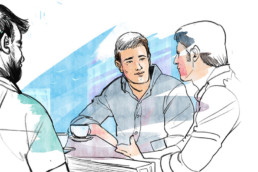
Both agreements between NHI and DSK were (a) perpetual, (b) had no termination rights whatsoever available to the developer, and (c) granted the publisher the right of first offer (ROFO) in relation to sequels and ports of both games.
Moreover, NHI registered the trademarks for both “Top Slop” and “Funeral Parlor Simulator” in its own name – in Europe, in the US, and in Asia (when asked about this, Marko explained that he did it to protect the games against possible problems that may have been caused by competitors piggybacking on the success of these titles).
It became obvious to Świętopełk and Marek that they must do something about these terms. For the first time in their lives, they hired a lawyer to help them unwind the situation, get paid and make sure that in the future, they will control the rights to their own work.
15. “Top Slop: Asian Branch”
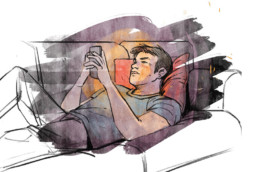
While the discussions about the debt were ongoing with Marko, Świętopełk and Marek came up with an idea for a possible second game in the Top Slop series, moving the setting to Asia (the proverbial home of the ramen shop in the storyline).
The tentative name of the game was Top Slop: Asian Branch. Recognizing that DSK is tied with NHI “forever”, in March 2023 Marek asked Marko via WhatsApp if he was at all interested in the next Top Slop game, given his unstable financial situation. Marko responded that he is not interested in the Top Slop series – however, he is ready to borrow some money to finance the development of the sequel of the FPS game.
16. Amendments
By May 2023, Świętopełk and Marek, with the help of their lawyer, managed to renegotiate both of their agreements with NHI.
In exchange to DSK committing to develop a sequel for the FPS game and release it through NHI, Marko conceded to:
- (a) transfer back to DSK the trademarks for both Top Slop and Funeral Parlor Simulator;
- (b) set a limited term for both agreements, at 15 years from their original releases;
- (c) introduce limited termination rights;
- (d) commit to a new schedule for the repayment of the existing debts of NHI to DSK.
What Świętopełk and Marek haven’t been able to achieve, though, was the removal of the ROFO clauses.
The changes to the agreement were signed as two amendments to the earlier documents.
17. Demeter
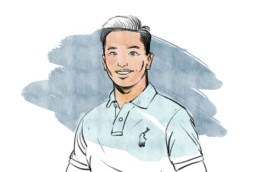
Tired and stressed by negotiations with Marko and driven by the idea of attaining independence from NHI, Świętopełk and Marek started to look for another potential publisher to develop a business relationship with.
Yes, Marko and NHI helped their games to achieve commercial success. But at the same time, Marko has proven to be an unreliable partner who took over the trademarks for their games – and delayed their royalties to the point where they almost had to fire some of the staff from the production team.
In the summer of 2023, the China Independent Games Alliance (CiGA / 中国独立游戏联盟) invited DSK to China Joy in Shanghai to give a talk in front of the local developers there.
Traveling to China for the first time, Świętopełk and Marek were impressed: not only by the futuristic trains and the high-rise hotels, but also by the games they’ve seen at the expo, including One Punch Man: World and Fantasy Westward Journey. And, of course, by the local food, which opened their eyes to a new world of flavours.
After their presentation, Świętopełk and Marek were approached by Clive Wong – a humble founder of a publishing house from Hong Kong. Clive had his own company, Demeter, Ltd., with a limited portfolio of mostly console games developed by Chinese teams – all set in China, Hong Kong or Taiwan.
18. Top Slop: Lou Fo Tong
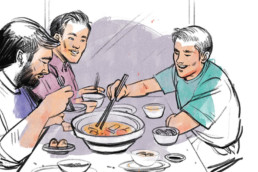
During the lunch with the DSK team, Clive learned about their idea of creating a Top Slop game set in Asia, and he suggested to call it Top Slop: Lou Fo Tong (after a Hong Kong soup, 老火湯), setting the events of the game in the Hong Kong of the ‘70s.
Clive also strongly suggested to focus on the mobile platform, proposing a “mobile first” strategy. As to the other platforms, he felt that the only option worth pursuing was Roblox – given the size of its audience, and the fact that they still lacked Asian-themed content at that time.
Clive proposed to fund the full budget required for the development of the new game, and to also contribute with creative supervision to make sure that the game fits the expectations of the audience in China.
After several months of negotiations, in December of 2023, Das Spiel Kebab and Demeter signed the deal to develop and release Top Slop: Lou Fo Tong on the mobile platforms, as well as in Roblox.
19. Two games, and a bit of trouble
For the first time in its history, DSK started working on two games at the same time – FPS 2 (PC) for Novac Hrenovac Inc. (since May 2023) and Top Slop: Lou Fo Tong (mobile/Roblox) for Demeter (since December 2023).
Everything was going well – until the announcement of Top Slop: Lou Fo Tong at Gamescom Asia in Singapore in October 2024. While Demeter ran a media event at the Suntec Convention Center, DSK supported it by posting the official announcement on Steam, at the hub of Top Slot: My Ramen Shop.
Having learned about the existence of this game from this Steam post, Marko was furious.
He messaged Świętopełk and Marek right away, telling them that they have breached their agreement with NHI – who had the right of first offer on any sequels or ports of Top Slop, so that Top Slop: Lou Fo Tong should have been offered to NHI first!
Moreover, NHI still owned the trademark for Top Slop in China and in the US. Despite Marko agreeing in writing to transfer the trademark to DSK within 90 days following the signature of the restated agreement, NHI transferred the trademark only in Europe – the rest of transfers were delayed, with different explanations.
20. The dispute
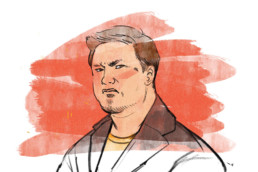
Świętopełk and Marek tried to explain to Marko that they fulfilled their obligations, as Marek proposed to NHI the new Top Slop game via WhatsApp a year ago – and Marko has clearly refused.
They also pointed to the fact that they have all agreed in writing that they own the trademarks for these games, and that Marko was supposed to transfer them everywhere by now.
Moreover, Lou Fo Tong wasn’t really a sequel, but a “spin-off”, and it was being developed not for PC or Steam, but for another platform altogether…
A few days after that, Novac Hrenovac Inc. filed a lawsuit against Das Spiel Kebab.
THE CLAIMS
In its lawsuit, NHI claims:
Breach of Contract:
DSK has breached its contractual obligations by entering into a publishing agreement for Top Slop: Lou Fo Tong with a third party without providing NHI with the opportunity to exercise its Right of First Offer prior to such agreement.
Specific Performance:
NHI requests the court to issue an order requiring DSK to duly honor the Right of First Offer (ROFO) and to re-offer Top Slop: Lou Fo Tong to NHI on the same terms as those extended to Demeter.
Damages I:
In the event that the court determines that specific performance is not possible, NHI seeks monetary damages for the loss of opportunity and profits resulting from the breach, including the sales of Top Slop: My Ramen Shop that were hindered or lost due to this breach.
Damages II:
DSK abused its access to Steam hub, using it to promote a product (Top Slop: Lou Fo Tong) which had nothing to do with NHI, and thus should compensate NHI for this. The promotion of Top Slop: Lou Fo Tong was tied with the update of Top Slop: My Ramen Shop, gaining over a million views on Steam.
Trademark Infringement:
NHI further requests the court to prohibit the use of the “Top Slop” trademark by any third party, including the third party involved in the agreement with DSK, to prevent further infringement or unauthorized use.